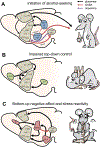Metabotropic Glutamate Receptors in Alcohol Use Disorder: Physiology, Plasticity, and Promising Pharmacotherapies
- PMID: 29792024
- PMCID: PMC6192262
- DOI: 10.1021/acschemneuro.8b00200
Metabotropic Glutamate Receptors in Alcohol Use Disorder: Physiology, Plasticity, and Promising Pharmacotherapies
Abstract
Developing efficacious treatments for alcohol use disorder (AUD) has proven difficult. The insidious nature of the disease necessitates a deep understanding of its underlying biology as well as innovative approaches to ameliorate ethanol-related pathophysiology. Excessive ethanol seeking and relapse are generated by long-term changes to membrane properties, synaptic physiology, and plasticity throughout the limbic system and associated brain structures. Each of these factors can be modulated by metabotropic glutamate (mGlu) receptors, a diverse set of G protein-coupled receptors highly expressed throughout the central nervous system. Here, we discuss how different components of the mGlu receptor family modulate neurotransmission in the limbic system and other brain regions involved in AUD etiology. We then describe how these processes are dysregulated following ethanol exposure and speculate about how mGlu receptor modulation might restore such pathophysiological changes. To that end, we detail the current understanding of the behavioral pharmacology of mGlu receptor-directed drug-like molecules in animal models of AUD. Together, this review highlights the prominent position of the mGlu receptor system in the pathophysiology of AUD and provides encouragement that several classes of mGlu receptor modulators may be translated as viable treatment options.
Keywords: Alcohol use disorder; bed nucleus of the stria terminalis; metabotropic glutamate receptor; nucleus accumbens; prefrontal cortex; synaptic plasticity.
Conflict of interest statement
The authors declare the following competing financial interest(s): P.J.C. has been funded by the National Institutes of Health, AstraZeneca, Bristol-Myers Squibb, the Michael J. Fox Foundation, the Dystonia Medical Research Foundation, the CHDI Foundation, and the Thome Memorial Foundation. Over the past three years, he has served on the Scientific Advisory Boards for the Michael J. Fox Foundation, the Stanley Center for Psychiatric Research Broad Institute, Karuna Pharmaceuticals, the Lieber Institute for Brain Development, Clinical Mechanism and Proof of Concept Consortium, and the Neurobiology Foundation for Schizophrenia and Bipolar Disorder. P.J.C. is an inventor on patents that protect different classes of mGlu receptor allosteric modulators. M.E.J., S.W.C., A.A.J., and D.G.W. declare no conflicts of interest.
Figures


References
-
- Koob GF, and Le Moal M (1997) Drug abuse: hedonic homeostatic dysregulation. Science 278, 52–58. - PubMed
Publication types
MeSH terms
Substances
Grants and funding
LinkOut - more resources
Full Text Sources
Other Literature Sources
Medical

